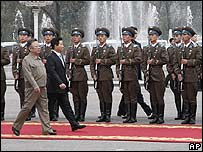 Tuesday, 2 October 2007
Tuesday, 2 October 2007
North Korea's reclusive leader Kim Jong-il has welcomed South Korean President Roh Moo-hyun to Pyongyang for a historic summit.
Live television footage showed the two men shaking hands ahead of three days of talks in the North Korean capital.
The summit between the two leaders is only the second such meeting in more than 50 years since the Korean war.
President Roh said he was aiming for a "peace settlement together with economic development".
The 1950-53 war between the two sides has never formally ended, but Seoul has promoted hopes for a permanent truce.
It says this summit may pave the way for that historic step.
Historic crossing
President Roh left the South Korean capital, Seoul, in a motorcade along with business leaders, bureaucrats, poets and clerics.  The convoy stopped at the demilitarized zone to allow the president and his wife, Kwon Yang-sook, to cross into the North on foot - the first time a South Korean leader has ever done this.
The convoy stopped at the demilitarized zone to allow the president and his wife, Kwon Yang-sook, to cross into the North on foot - the first time a South Korean leader has ever done this.
They stepped across a yellow plastic tape, printed with the words "peace" and "prosperity".
"I do hope after my crossing that more people will follow suit," said President Roh at the border. "This line will gradually be erased and the wall will fall."
Arriving in Pyongyang, he was greeted by Mr Kim, who was wearing his trademark khaki jumpsuit, in front of crowds who cheered and waved paper flowers.
Mr Roh has now gone to a state guesthouse where he will stay for the course of the summit. He is expected to hold formal talks with Mr Kim on Wednesday.
Economic aid
The two states' only other summit was held in Pyongyang in 2000.
At the time, Kim Jong-il promised to make the return journey to Seoul, but that has never happened.
The first summit led to the former South Korean President Kim Dae-jung winning the Nobel Peace Prize for his "sunshine policy" of rapprochement with the North.
Since then, rail and road links have been built, although there has only been one, symbolic border rail crossing. Families divided between the two countries have also been granted reunions, if only briefly.
But critics say the South's attempts at friendship and large donations of aid have failed to break down the impoverished North's isolationism or improve its human rights record.
Some observers doubt whether Kim Jong-il has any appetite for reconciliation, says the BBC's John Sudworth in Seoul.
They believe he prefers to keep his military threat to coax further economic aid and other concessions from the nervous South, our correspondent says.
The South Korean leader, meanwhile, has been accused of using the summit to boost his popularity.
Mr Roh is approaching the end of his term of office and the conservative opposition are leading in opinion polls ahead of elections in December.
They have warned Mr Roh against making any "naive" economic concessions just for the sake of an agreement.
"They must know that an emotional approach to the North would bring on disasters," spokeswoman Na Kyung-won said.
No official agenda has been announced for the talks, but one item that is not expected to be discussed is North Korea's nuclear weapons programme. That is being left for ongoing multi-party talks, which made significant progress over the weekend.
A joint statement setting out the next step in the denuclearisation progress was agreed, and has been sent for approval to the six governments involved, including the two Koreas.
Korean leaders in historic talks
Categories: Asia-Pasific, Headline News, World News
Musharraf appoints army successor
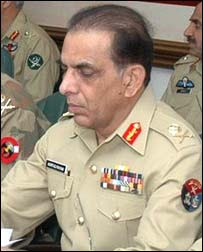 Tuesday, 2 October 2007
Tuesday, 2 October 2007
Pakistan's President Pervez Musharraf has named his successor to take over as army chief, the military says.
The appointee is former head of intelligence Lt Gen Ashfaq Pervez Kiani, military spokesman Maj Gen Waheed Arshad told the BBC.
Gen Musharraf will resign as head of the army if he wins presidential elections on Saturday, his lawyers say.
Opposition parties say his candidacy is illegal and that he has broken previous promises to resign as army chief.
Lt Gen Kiani has been appointed deputy chief of army staff and will take over the top post when it falls vacant, the military says.
It is not clear when that will be.
Gen Musharraf's lawyers told the Supreme Court last week that he would stand down as army chief "soon after election and before taking the oath of office as president".
Lt Gen Kiani headed Pakistan's notorious Inter-Services Intelligence agency from 2004 until last month.
He took part in secret talks recently on a possible power sharing deal between President Musharraf and former PM Benazir Bhutto.
His appointment will be closely watched in Washington which has been putting pressure on Pakistan to do more in the US-led "war on terror".
Boycott
The BBC's M Ilyas Khan in Karachi says Lt Gen Kiani earned Gen Musharraf's confidence when he headed the investigation into two attempts on the president's life in December 2003, bringing a number of suspects to trial in a secret military court.
News of his appointment came as scores of opposition MPs resigned from Pakistan's national parliament and provincial assemblies in protest at Saturday's presidential election.
They insist that President Pervez Musharraf is ineligible to stand.
Correspondents say that the resignations make it even more certain that Gen Musharraf will win the vote.
Members who resigned from the assemblies on Tuesday were drawn mainly from the alliance of Islamic parties, the MMA, and the PML-N party of former Prime Minister Nawaz Sharif.
"We are handing over the resignations today because we consider the election of the president is illegal and unconstitutional," one leading MP, Liaquat Baloch, said, the AFP news agency reports.
The MPs hope the resignations will make the presidential election be seen to be meaningless.
"This is the first step to discredit the election process," said former cricket star and MP Imran Khan, whose party is part of the opposition APDM alliance.  The country's biggest party is the Pakistan People's Party (PPP) of former Prime Minister Benazir Bhutto. It is not taking part in the boycott.
The country's biggest party is the Pakistan People's Party (PPP) of former Prime Minister Benazir Bhutto. It is not taking part in the boycott.
Meanwhile two rival candidates for Saturday's election have filed fresh petitions in the Supreme Court against Gen Musharraf's candidacy.
Last Friday the court dismissed a number of petitions, in a move seen as a major victory for the president.
The president is elected by MPs from the national assembly and Pakistan's four provincial assemblies.
The petitions filed by lawyers representing two candidates standing against President Musharraf, retired Judge Wajihuddin Ahmed and Makhdoom Amin - vice chairman of the PPP - say that the president is not eligible to stand while also remaining head of the army.
Categories: Headline News, South Asia, World News
UN envoy holds key Burmese talks
 Tuesday, 2 October 2007
Tuesday, 2 October 2007
UN special envoy Ibrahim Gambari has met detained Burmese opposition leader Aung San Suu Kyi for a second time, hours after talks with military rulers.
The meeting took place on Mr Gambari's return from the new capital, Naypyidaw, where he conveyed to General Than Shwe concerns over a violent crackdown.
At least 10 people were killed, possibly many more, when troops ended days of pro-democracy demonstrations.
Rangoon, the main city and centre of unrest, has eased its curfew.
Loudspeakers mounted on trucks were used to announce it would run from 2200 (1430 GMT) to 0400 instead of 0900 to 0500.
Kept waiting
Mr Gambari's meetings suggest he is trying to establish some kind of dialogue between the government and the opposition, BBC South East Asia correspondent Jonathan Head says.
The envoy is now on his way to Singapore. He had waited four days to see Gen Than Shwe before the chairman of Burma's State Peace and Development Council (SPDC) made himself available.
No details have emerged but Mr Gambari was intending to urge the general "to cease the repression of peaceful protest", release detainees and embrace democracy and human rights, a UN spokesman said before the talks.
The US called on the UN envoy to press upon the military the need for a "real and serious political dialogue with all relative parties".
Mr Gambari came to the talks after his first meeting with Aung San Suu Kyi on Sunday.
He had also been taken by the Burmese authorities to see a pro-government rally in the town of Lashio.
'Neo-colonialism'
The general's reaction to Mr Gambari's comments is likely to have been the same as that of Foreign Minister Nyan Win to the UN, says the BBC's Chris Hogg in Bangkok, in neighbouring Thailand.
Nyan Win gave his government's version of events in Burma to the UN General Assembly.
Blaming "neo-colonialism" for distorting events in Burma, he said that a small initial protest "against the rise in fuel prices" had been exploited by "political opportunists".
"They also took advantage of protests staged initially by a small group of Buddhist clergy demanding apology for maltreatment of fellow monks by local authorities," he added.
Security forces, he said, had exercised "utmost restraint¿ against an "unruly and provocative" mob and "normalcy" had been restored.
'Disrobed and shackled'
Almost two weeks of sustained popular protest were halted when police and soldiers moved against protesters late last week.
The authorities said 10 people were killed, though diplomats and activists say the number of dead was many times higher.
About 4,000 monks have been rounded up in Rangoon over the past week and are being held at a disused race course and a technical college, the BBC has learned.
Sources from a government-sponsored militia said they would soon be sent to prisons in the far north of the country.
The monks have been disrobed and shackled, the sources told BBC radio's Burmese service. There are reports that the monks are refusing to eat.
In Geneva, the UN Human Rights Council is holding an emergency session which is expected to hear testimonies from witnesses to the violence.
"As the protesters are becoming invisible, our concern only increases for the safety and well-being of the monks, presumably confined to their monasteries if not worse," High Commissioner Louise Arbour said.
The 47-nation council lacks enforcement powers, and is limited to focusing global attention on human rights offenders.
Categories: Asia-Pasific, Headline News, World News
UK troops in Basra cut by 1,000
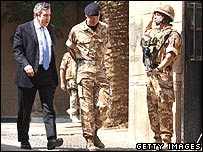 Tuesday, 2 October 2007
Tuesday, 2 October 2007
UK troops in Basra are to be cut by 1,000 by the end of the year, Gordon Brown has said on a visit to Baghdad for talks with senior politicians.
Mr Brown also confirmed Basra province could be handed over to full Iraqi control in the next two months.
Britain currently has about 5,500 troops stationed at Basra Airport.
Mr Brown, on his first visit to Iraq as UK prime minister, praised the troops for their "great courage, professionalism and bravery".
'Difficult job'
He said: "What we propose to do over these next few months is to move from a situation where we have a combat role to an overwatch role."
This would involve the present British force of 5,500 being cut to 4,500 - freeing up the troops for other duties, he said.
"Hopefully they will be home by Christmas," Mr Brown told reporters.
He also announced plans for a new investment agency and development fund for Basra to help regenerate the economy.
The prime minister called for a renewed effort by the Iraqi political parties to achieve political reconciliation.
He added: "I am very proud of what our armed forces are achieving here. I believe they have acted with great courage, professionalism and bravery.
"We will discharge our obligations to the Iraqi people and to the international community and we will discharge our obligations to our armed forces, who are doing this difficult job."
Commons statement
Mr Brown landed at Baghdad International Airport under heavy guard on Tuesday morning before being taken by helicopter to the fortified Green Zone.
Mr Brown was in talks with Iraqi Prime Minister Nouri Maliki for an hour. He was also due to meet the US commander in Iraq, General David Petraeus.
BBC political correspondent James Hardy said he went straight into meetings before making the surprise announcement that 1,000 troops would be home from Iraq by Christmas.
Mr Brown will tell the Commons next week that more still needs to be done in Iraq including political reconciliation and economic regeneration.
But army figures are warning that a significant force will have to stay indefinitely, our correspondent said.  It is thought British forces are likely to stay in Basra for up to two more years on "overwatch", which involves mentoring and training the Iraqis rather than patrolling.
It is thought British forces are likely to stay in Basra for up to two more years on "overwatch", which involves mentoring and training the Iraqis rather than patrolling.
Conservative leader David Cameron said he would support a withdrawal of some British troops from Iraq if local forces were ready to take over.
"If it is now possible to hand over progressively to the Iraqi army and to bring more of our troops back home, then he will certainly have my support," he told BBC Radio 4's Today programme.
Later, at the Conservative Party conference, shadow defence secretary Liam Fox accused Mr Brown of pursuing photo opportunities and failing to grasp the needs of the military.
Lindsey German, convener of the Stop The War Coalition, said the withdrawal of troops was a welcome development, but was not "a serious attempt to deal with the disastrous Iraq war".
Meanwhile, Britain's consul general in Basra, Richard Jones, has told the BBC the dominant feeling among local people was fear.
He said the local police force had been infiltrated by hardline Shia militias.
Iraqi residents told the BBC they feared that could mean all-out war between rival militias once Britain hands over security to local forces.
Mr Brown has prepared for many weeks to announce that British troops will finally be able to hand over the last of four provinces to Iraqi forces to control.
Categories: Headline News, UK, World News
FBI to investigate Iraq shootout
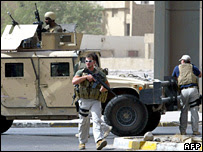 Tuesday, 2 October 2007
Tuesday, 2 October 2007
The FBI is to investigate the role of the private security firm, Blackwater USA, in the fatal shooting of 11 Iraqi civilians in Baghdad last month.
An FBI spokesman said criminal charges were possible if its inquiry agreed with the Iraqi government's findings.
Iraq has accused Blackwater's employees of opening fire on civilians without provocation, a charge the firm denies.
Later on Tuesday, Blackwater's chairman will appear before a Congressional committee investigating the incident.
Erik Prince has insisted his firm's personnel acted in self-defence after insurgents attacked the US diplomatic convoy they were protecting.
"We look forward to setting the record straight on this issue and others tomorrow when [he] testifies before the committee," his spokeswoman, Anne Tyrrell, said on Monday.
Criminal liability
The FBI's investigation is the fourth into the shooting at al-Nisoor square in the Iraqi capital on 16 September and was begun at the request of the US state department.
Special Agent Richard Kolko said the FBI would send a team to Iraq to examine the possibility of bringing criminal charges in light of the allegations that Blackwater guards shot innocent Iraqi civilians.
The Iraqi Prime Minister, Nouri Maliki, has described the shooting as a "criminal act" and an inquiry by the Iraqi interior ministry has concluded the security guards were "100% guilty".
Private Security Contractors (PSCs) are currently granted immunity from prosecution under Iraqi law by Order 17 of the now defunct Coalition Provisional Authority, although they are technically subject to the law of their "sending state".
Congressional report
The BBC's Justin Webb in Washington says that after years of profitable business in the shadows of the Iraq insurgency, the private security industry is suddenly in the spotlight and in trouble. 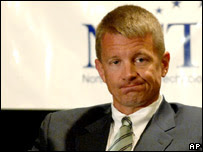 The Congressional committee which is preparing to ask tough questions of Erik Prince, Blackwater's chairman, later on Tuesday has produced a report on the eve of the hearing that suggests he may well be on the defensive, our correspondent says.
The Congressional committee which is preparing to ask tough questions of Erik Prince, Blackwater's chairman, later on Tuesday has produced a report on the eve of the hearing that suggests he may well be on the defensive, our correspondent says.
The report prepared by the staff of the committee's chairman, Henry Waxman, released details from Blackwater's own accounts of several incidents involving Iraqi casualties, in which it said its employees had fired first on 163 out of 195 occasions.
In the majority of cases, the guards fired their weapons from moving vehicles without stopping to count the dead or assist the wounded, the report said.
It also said state department officials had recommended compensation payments to victims' family members in at least two cases.
US diplomats also helped a Blackwater employee leave Iraq less than 36 hours after he killed a bodyguard of one of Iraq's vice-presidents while drunk. He faced no criminal charges.
"There is no evidence in the documents that the committee has reviewed that the state department sought to restrain Blackwater's actions, raised concerns about the number of shooting episodes involving Blackwater or the company's high rate of shooting first, or detained Blackwater contractors for investigation," the report said.
"It appears that the state department's primary response was to ask Blackwater to make monetary payments to put the 'matter behind us' rather than to insist upon accountability or to investigate Blackwater personnel for potential criminal liability."
Blackwater has earned more than $1bn (£490m) from US government contracts since 2001. The state department paid the company more than $832m (£408m) for security work between 2004 and 2006.
Categories: Headline News, Middle East, World News
'Elders' in landmark Darfur visit
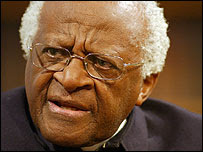 Tuesday, 2 October 2007
Tuesday, 2 October 2007
A delegation of influential elder statesmen led by Archbishop Desmond Tutu is travelling to Darfur to try to find solutions to the conflict.
The "Elders" will be talking to local community leaders and to displaced people living in camps.
The visit comes three days after an attack on the African Union base in southern Darfur left 10 soldiers dead.
At least 200,000 people have died and some 2m forced from their homes during the four year conflict.
The BBC's Amber Henshaw, who is travelling with the delegation, says they hope to lend their strength to those who are determined to bring and end to the devastation.
But Archbishop Tutu has warned against unrealistic expectations, saying: "The Elders do not want to raise anyone's hopes during this visit".
Travelling in the delegation are the former US President Jimmy Carter, veteran UN envoy Lakhdar Brahimi and children's rights advocate Graça Machel, better known as Mrs Nelson Mandela.
Following talks with the Sudanese government in Khartoum on Monday, the delegation travelled to Juba in southern Sudan to assess the comprehensive peace agreement signed between the North and South before flying to El Fasher in Darfur.
There they are expected to be briefed on the latest violence, including the most recent attack - the worst on AU forces in the province.
Battle for Haskanita
Details are finally emerging of the intensity of Saturday's attack on the AU base at Haskanita.
AU soldiers told AP news agency that a large force numbering up to 1,000 well-equipped Darfuri rebels attacked the AU outpost at dusk, catching the 157 soldiers and support staff by surprise.
Rockets started falling on the base and an armoured personnel carrier took a direct hit as the beleaguered AU force, mainly composed of Nigerian soldiers, fought off the initial attack.
The rebels then mounted a second attack, using armoured vehicles and firing rocket-propelled grenades. The battle raged until around 0400 local time when the AU forces ran out of ammunition and were overrun.
One of the soldiers told AP: "Once we ran out of ammunition, we all laid down in that ditch."
As morning broke the Sudanese army arrived and the rebels withdrew, leaving behind 10 dead and seven injured.
First reports said up to 47 AU soldiers were unaccounted for, the figure was later revised down to 23 and by late Monday another 20 had reached another AU base, AP reports.
"(The survivors) are in a state of shock", said AU mission chief Rodolphe Adada.
The new Commander of the future hybrid United Nations-AU peacekeeping force in Darfur, General Martin Agwai, told the BBC from Haskanita on Monday that he was convinced the attackers were a splinter group who had broken away from a faction of the Sudan Liberation Army (SLA), known as the SLA United.
International reaction
In the aftermath of Saturday's rebel attack on the AU monitors at Haskanita, the United States has threatened further sanctions against both the Sudanese government and rebel groups if they block the Darfur peace efforts.
State Department spokesman Sean McCormack said the punitive measures could include travel bans and financial restrictions on individuals.
A Senegalese soldier serving with the UN monitors was one of those killed, prompting Senegal to warn it could withdraw its peacekeeping troops altogether.
Botswana, however, which also lost one soldier, said it remained committed to the peacekeeping operation.
Human Rights Watch has described the killings as a war crime, and has called for an immediate investigation by the AU and UN.
Categories: Africa, Headline News, World News
Diana and Dodi inquest under way
 Tuesday, 2 October 2007
Tuesday, 2 October 2007
The inquest into the death of Diana, Princess of Wales, and Dodi Al Fayed has begun at London's High Court.
A jury of six women and five men has been selected for the hearing, which could last six months. They were chosen by ballot from a shortlist of 25.
Throughout the case, jurors will be escorted to and from court by police.
The princess and Mr Al Fayed died in a car crash in the Pont d'Alma tunnel, in Paris, on 31 August 1997.
Untarnished truth
Arriving at the High Court, Dodi's father, Mohamed Al Fayed, said he wanted justice for his dead son.
"I'm hoping for justice, I'm a father who lost his son. I have been fighting for 10 years, at last I want to have justice."
The Harrods boss added that he remained convinced that the princess and his son were "murdered".
Speaking earlier, a spokesman for Mr Al Fayed called for members of the Royal Family to give evidence at the hearing.
Michael Cole told GMTV this was the "last best chance to get at the plain untarnished truth".
"At stages in her life the only person Diana could talk to in confidence in the Royal Family was the Queen," he said.
"She has an unrivalled knowledge of the princess' state of mind."
Selection process
Last Thursday, some 227 candidates for jury service were summoned by letter to London's Royal Courts of Justice, but only 80 turned up.
The 80 were handed a list of 10 questions ordering them to reveal any connections to the Royal Family, Mohamed Al Fayed, or the security services.
The final panel of 11 jurors was selected on Tuesday by ballot from a potential 25 and their names were read out by a court official.
During last week's proceedings, coroner Lord Justice Scott Baker said the deaths of Princess Diana and Mr Al Fayed had "created worldwide interest on an unprecedented scale".
"Millions of words have been spoken and written. There are numerous books, television programmes, articles that have been published, some by those who are closely involved in surrounding events and some not," the coroner said.
But jurors would be required to come to a decision based only on court evidence, he added.
"If there are any articles in the newspapers, do not read them, and if there are any television programmes about the death of Diana or any news items about these inquests, you should not look at them," he told the 80 candidates.
In the second week of the hearing, the jury will be flown to Paris to retrace Diana's final journey.
Categories: Headline News, UK, World News
Spears loses custody of children
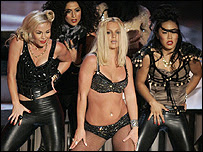 Tuesday, 2 October 2007
Tuesday, 2 October 2007
Singer Britney Spears has been ordered to hand over her two young children to her former husband.
Los Angeles judge Scott Gordon said Kevin Federline should be given custody of Sean Preston, two, and one-year-old Jayden James, until "further notice".
The couple had shared custody and the reason for the change was not given.
The decision comes two weeks after the same judge said the pop star engaged in "habitual, frequent and continuous use of controlled substances and alcohol".
'Nudity and drug use'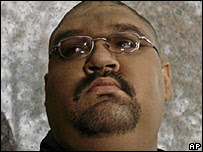 At that hearing, he ordered the 25-year-old singer to undergo random drug and alcohol testing twice a week.
At that hearing, he ordered the 25-year-old singer to undergo random drug and alcohol testing twice a week.
Both parents were told to complete a parenting class and Spears was ordered to have weekly meetings with a "parenting coach".
The judge has not explained whether or not she carried these out successfully.
But on Monday, he ruled that Federline "is to retain physical custody of the minor children on Wednesday October 3, 2007 at 12pm until further order of the court".
Spears' former bodyguard Tony Barretto, 28, who claimed he was sacked by the star, said he was prepared to testify against her during the custody battle.
He has said there were "issues of nudity by Ms Spears, drug use, and safety issues involving the children post-rehab".
The judge's order came 10 days after the singer was charged with leaving the scene of an accident after allegedly driving into a parked car, and driving without a valid licence.
If found guilty she could go to jail for six months.
She was also dropped by her management firm last month following her so-called comeback performance at the MTV Video Music Awards, which was panned by critics.
Ms Spears married Mr Federline, then a backing dancer, in October 2004, but the pair filed for divorce last November.
The divorce was finalised on 30 July and since then, the estranged couple have shared an equal amount of time with the two boys.
However, Mr Federline has been fighting for greater time and more money.
Representatives for Spears and Federline were not immediately available for comment.
Categories: Entertainment, Headline News, World News
Alonso wants split from Hamilton
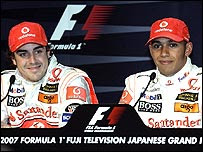 Fernando Alonso says he would rather not continue alongside Lewis Hamilton at McLaren next year.
Fernando Alonso says he would rather not continue alongside Lewis Hamilton at McLaren next year.
The Spaniard, set to lose the title to his team-mate, said: "I'd be delighted if I didn't carry on with Hamilton."
"If we are not together next season and I can go to a good car, then great. If we have to carry on together then we will have another great battle."
Meanwhile, Renault team boss Flavio Briatore has confirmed he has offered Alonso his old job back.
"I told Fernando that the moment he is free from McLaren we would be pleased to have him back," said Briatore.
Briatore is convinced Alonso would not have quit Renault if he had been aware he would receive the same treatment as a rookie.
"If, before signing the contract, they told Fernando, 'Come with us, but you won't have any sort of advantage', he wouldn't have gone," Briatore told Italian newspaper Gazzetta dello Sport.
"If you hire a world champion, then you must give him the number one status."
The relationship between the two McLaren drivers deteriorated after Hamilton criticised Alonso last week.
Alonso, who was speaking in an interview with Spanish radio station SER, also denied speculation he could take 2008 off, returning to Formula One to drive for Ferrari when his McLaren contract runs out in two years' time.
"It hasn't entered into my plans not to race next year," he said.
"I don't have any news about Ferrari. They have a contract with Kimi Raikkonen and Felipe Massa for next year, it's not a possibility that has entered into my thoughts for the coming year."
Hamilton says he would rather Alonso was not still at McLaren next year, even if it meant the double world champion ending up at Ferrari.
"I'd much rather it were Fernando at Ferrari and me at McLaren," said Hamilton prior to winning at Fuji Speedway on Sunday.
Alonso's relationship with McLaren team boss Ron Dennis has broken down after a series of disagreements during the year.
It reached a low point during a row at the Hungarian Grand Prix in August over Alonso's status in the team.
Alonso threatened during the row to reveal incriminating e-mail evidence about McLaren's involvement in the spy row that has dominated the sport this summer to the sport's governing body, the FIA.
He quickly apologised and withdrew the threat, but not before Dennis had telephoned FIA president Max Mosley to tell him of the conversation.
It ultimately led to McLaren being thrown out of this year's constructors' championship and fined £49.2m for having confidential Ferrari technical information in their possession.
And Hamilton has turned up the pressure on McLaren to tear up Alonso's contract, which still has two years to run, by saying he sees a long-term future at the team.
Categories: Headline News, Sport News, World News
Acquittals in Canada blood trial
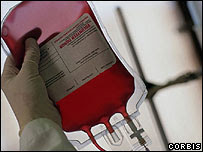 A Canadian judge has acquitted four doctors and a US drug company of criminal negligence in a long-running tainted-blood scandal.
A Canadian judge has acquitted four doctors and a US drug company of criminal negligence in a long-running tainted-blood scandal.
At least 20,000 people were infected with hepatitis C or HIV in the 1980s and 1990s before Canada used up-to-date blood screening practices.
At least 3,000 people are known to have died as a result of receiving tainted blood products.
The case is the first to stem from Canada's worst public health disaster.
The trial covered seven of the more than 1,000 people who were infected from an HIV-infected blood-clotting product made by US-based Armour Pharmaceutical.
A second trial will deal with the bulk of the deaths and the thousands infected with hepatitis C.
'Tragic events'
The defendants in the 18-month trial included Dr Roger Perrault, the former director of the Canadian Red Cross and two former Health Canada officials, Dr John Furesz and Dr Donald Boucher.
The US-based drug company Armour Pharmaceutical and one of its former vice-presidents, Dr Michael Rodell, were also on trial. 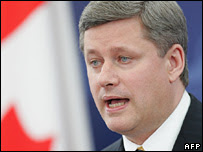 The defendants were alleged to have failed to screen blood products and take adequate measures to prevent people infected with HIV and Aids from donating their blood.
The defendants were alleged to have failed to screen blood products and take adequate measures to prevent people infected with HIV and Aids from donating their blood.
A comprehensive blood screening system was in use in the United States in the late 1980s and early 1990s but was not adopted in Canada.
Ontario provincial Superior Court Justice Mary Lou Benotto said the events were "tragic, but to assign blame where none exists would compound the tragedy," the Canadian Broadcasting Corporation reported.
In July 2006, the Canadian government announced a C$1bn ($1.008bn) compensation package for thousands of people infected with hepatitis C from tainted blood.
The package included thousands of people left out of a previous compensation agreement.
In May that year, the Canadian Red Cross apologised to the thousands of Canadians infected as a result of the tainted blood.
The government withdrew charges of criminal negligence causing bodily harm against the charity in exchange for a guilty plea under the Food and Drugs Act.
Categories: Americas, Headline News, Health, World News
IMF boss 'calms slowdown fears'
 Monday, 1 October 2007
Monday, 1 October 2007
Dominique Strauss-Kahn says that the slowdown in the US sub-prime mortgage market should not have a dramatic impact on the world economy.
Mr Strauss-Kahn was giving his first news conference since being named as the next head of the International Monetary Fund (IMF) on Friday.
"I think the situation is now under control," the socialist former French finance minister said.
"The bases of world growth today are solid bases," he added.
Sub-prime mortgages are offered to homebuyers with low incomes or poor credit records.
There have been record defaults on them in the US as rising interest rates and falling house prices have caused problems for borrowers.
The defaults have raised questions about the value of debt that has been passed around the banks.
The former head of the Federal Reserve, Alan Greenspan, predicted on Monday that the sub-prime crisis would lead to, at best, an economic slowdown and more likely a recession in the US that would have knock-on effects worldwide.
Renewed criticism
Mr Strauss-Kahn will take over as managing director of the IMF on 1 November.
The IMF is a multinational body charged with giving financial aid and assistance to developing countries to secure global financial stability.
His appointment renewed criticism of the system under which Europe gets to choose the head of the IMF while the US chooses the boss of the World Bank.
Describing himself as a "free-market socialist", he said that he would gear policy to meet the needs of emerging and low-income economies.
Some of those countries have complained that the IMF is too dominated by rich countries and that the conditions they place on their loans are too strict.
Mr Strauss-Kahn said he had travelled 100,000km (60,000 miles) to convince many of the IMF's 185 member countries that he had a workable plan for the future of the institution.
Categories: Businnes News, Headline News, World News
Zimbabwe 'running out of bread'
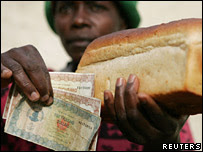 Monday, 1 October 2007
Monday, 1 October 2007
Reports from Zimbabwe say bakeries have run out of flour and there will be no bread in the foreseeable future.
The Agriculture Ministry has confirmed that this year's wheat harvest yield of 145,000 tonnes is only one third of the country's requirements.
Agriculture Minister Rugare Gumbo is quoted as blaming the shortages on the failings of what he called the "new farmers" created by the land reforms.
Last week, the government announced it would import 100,000 tonnes of wheat.
But even that would still leave Zimbabwe short of its 400,000 tonne target for this year.
And it appears that a shortage of hard currency has already stranded a shipment of 35,000 tonnes of imported wheat at the Mozambican port of Beira.
Last week, Zimbabwe's main bread producer Lobels Bread said it had scaled back its operations by 80% and had only two days' supply of flour left.
The AP news agency says stores across Zimbabwe are now telling customers that bread will not be available until further notice.
The blame game
The Sunday Mail newspaper in Zimbabwe reported that this year's production was badly affected by erratic power supplies that resulted in some farmers completely abandoning their crop at germination levels because of the failure to irrigate.
Other reports quoted the agriculture minister as pinning the blame on farmers. 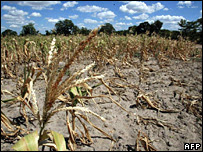 Speaking last Thursday at the Zimbabwe Farmers' Union (ZFU) national congress in Masvingo Minister Gumbo said: "I am disappointed that our new farmers have proved to be failures since the start of the land reform programme in 2000."
Speaking last Thursday at the Zimbabwe Farmers' Union (ZFU) national congress in Masvingo Minister Gumbo said: "I am disappointed that our new farmers have proved to be failures since the start of the land reform programme in 2000."
"In spite of all the support government has been pouring into the agricultural sector, productivity and under-utilisation of land remain issues of concern," he added.
And he admitted that he was "painfully aware of the widespread theft of stock, farm produce, irrigation equipment and the general vandalism of infrastructure by our new farmers".
Zimbabwe Commercial Farmers Union director Mr Phillip Tavuyanago told the Sunday Mail the failed harvests meant wheat farmers would be heavily affected in terms of paying back loans accessed during the winter programme.
Critics have blamed President Mugabe's policies, especially the seizure of farms from their former white owners, for ordinary Zimbabweans' hardship.
A foreign currency crisis has helped push inflation to record levels in recent months.
Government price controls have been blamed for worsening shortages.
For his part, President Mugabe has accused foreign governments of trying to interfere in Zimbabwe's affairs - saying some businesses had raised prices without justification as part of a Western plot to oust him.
Categories: Africa, Headline News, World News
Darfur attack kills peacekeepers
 An attack on an African Union army base in the Sudanese region of Darfur has killed at least 10 peacekeepers.
An attack on an African Union army base in the Sudanese region of Darfur has killed at least 10 peacekeepers.
Thirty vehicles overran the base, and 50 AU soldiers were missing and seven seriously injured. Vehicles and property were looted or vandalised.
Rebel sources told the BBC that the raiders were members of breakaway factions from two rebel groups.
The attack came as S African Archbishop Desmond Tutu arrived in Sudan bringing a new peace initiative for Darfur.
The casualties were the most serious suffered by the AU mission since it arrived in 2003, an AU statement said.
AU-UN Joint Special Representative Rodolphe Adada said he was profoundly shocked and appalled by the "outrageous and deliberate" attack, which happened on Saturday evening at a base in Haskanita town.
BBC Africa analyst Martin Plaut says the fighting comes at a particularly unfortunate moment, with discussions about to take place between the AU and UN to pave the way for peace talks between government and rebels.
Prospects of an agreement at the talks are starting to look bleak, he says.
'Unconscionable crime'
A spokesman for the rebel Justice and Equality Movement (JEM) condemned the attack, saying it was carried out by three dissident commanders from his own movement, in conjunction with one of the groups that broke from the Sudan Liberation Army.
"It's a group which has been expelled," Ibrahim Jalil said.
"They're looking for equipment - vehicles and weapons. They couldn't get these within JEM, and they don't have the capability to fight government forces. They found the AU an easy target."
Sources told the BBC that the attackers made off with all the weapons and vehicles they were able to take, and burned the vehicles that remained.
The AU statement described the attackers as "a large and organised group of heavily armed men", but did not say whether they were rebels or government troops.
"It is staggering to imagine what could possibly have been the intentions of those who perpetrated this wanton and unprovoked act," Mr Adada said.
"Not only was it a flagrant violation of the ceasefire but an unconscionable crime that breaks every convention and norm of international peacekeeping."
Mission to Sudan
About 7,000 African Union troops are deployed in Darfur on a limited mandate.
The UN Security Council has approved a 26,000-strong peacekeeping force to expand the current AU force, which has been struggling to protect civilians.
On Sunday Archbishop Tutu arrived in Khartoum - in the latest initiative to bring peace to Darfur.
The archbishop is leading a delegation of "elders" that includes former UN envoy to Iraq Lakhdar Brahimi, US ex-President Jimmy Carter, and Graca Machel, a children's rights advocate and the wife of Nelson Mandela.
The group came together at Mr Mandela's invitation to find ways to tackle some of the world's toughest problems, such as HIV/Aids, poverty and conflict.
Commenting on the attack on the AU, Mr Tutu said: "It just shows how desperate the situation is, how desperately we've got to find a peaceful solution so that incidents of that kind don't happen."
The BBC's Amber Henshaw in Khartoum says it is no coincidence that Darfur is the focus of the group's first mission.
At least 200,000 people have died and some 2m have been forced from their homes during the four-year conflict.
The delegation will meet President Omar al-Bashir and others in Khartoum before travelling to Juba, capital of southern Sudan.
They will then travel to Darfur where they will meet community leaders and displaced people living in camps.
Categories: Africa, Headline News, World News
Tottenham 4-4 Aston Villa
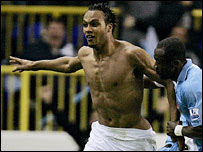 Younes Kaboul completed an amazing comeback by Tottenham as they fought back from 4-1 down to hold Aston Villa.
Younes Kaboul completed an amazing comeback by Tottenham as they fought back from 4-1 down to hold Aston Villa.
Dimitar Berbatov nodded Spurs in front but Martin Laursen levelled after Paul Robinson's error, then made it 2-1 when he deflected in Zat Knight's header.
Gabriel Agbonlahor drilled home a third and Craig Gardner's low free-kick made it 4-1 before Pascal Chimbonda replied after Jermain Defoe had hit the post.
Robbie Keane's penalty made it 4-3 before Kaboul's last-gasp leveller.
Tottenham remain in the bottom three of the Premier League but their under-fire boss Martin Jol can take heart from the way his side responded when facing almost certain defeat.
But while the manner in which the home side earned their point will ease the pressure on Jol, he will know he must solve the defensive problems which meant they had to work so hard to get something from this game.
Spurs had celebrated their 125th anniversary with a parade of legends before kick-off but the party did not continue for long once the game was underway.
True, Jol's side were looking dangerous going forward but Tottenham's continuing difficulty in dealing with Villa's attacks meant that, just two minutes after Berbatov rose to nod the home side ahead, the visitors were level.
Robinson inexplicably dropped Gareth Barry's corner and the ball bounced kindly for Laursen, who smashed his shot into the unguarded net.  Villa's second goal was almost as embarrassing for the Tottenham defence, a quick free-kick catching them unawares and, from another Barry cross, Knight headed the ball against Laursen, through Robinson's legs and into the net.
Villa's second goal was almost as embarrassing for the Tottenham defence, a quick free-kick catching them unawares and, from another Barry cross, Knight headed the ball against Laursen, through Robinson's legs and into the net.
Things got even worse for Spurs before the break when Gabriel Agbonlahor latched on to a clearance from Villa keeper Scott Carson, held off Michael Dawson and fired into the bottom corner.
And when Robinson failed to keep out Craig Gardner's low free-kick early in the second half, things looked ominous for Spurs and for Jol.
But Tottenham never gave up and, with Defoe brought off the bench, they belatedly began to threaten again.
The England striker hit the post before Chimbonda netted from the rebound to give his side hope, then Robbie Keane brought the score back to 4-3 from the spot after Marlon Harewood clumsily fouled substitute Darren Bent.
It still looked like Villa would hold on but Kaboul had other ideas, slamming home in stoppage time after Villa failed to clear a corner.
Tottenham: Robinson, Chimbonda, Dawson, Kaboul, Bale, Lennon (Malbranque 86), Zokora, Huddlestone, Tainio (Defoe 54), Berbatov (Bent 73), Keane.
Subs Not Used: Cerny, Rocha.
Booked: Kaboul.
Goals: Berbatov 20, Chimbonda 69, Keane 82 pen, Kaboul 90.
Aston Villa: Carson, Mellberg, Knight, Laursen, Bouma, Gardner (Petrov 73), Reo-Coker, Barry, Young, Moore (Harewood 66), Agbonlahor.
Subs Not Used: Taylor, Davies, Osbourne.
Booked: Reo-Coker, Gardner, Carson.
Goals: Laursen 22, 33, Agbonlahor 40, Gardner 59.
Att: 36,094
Ref: Mike Dean (Wirral).
Categories: Headline News, Sport News, World News
Terry could make return in mask
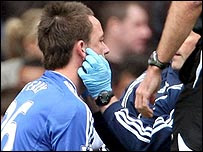 Chelsea captain John Terry could face Valencia in Wednesday's Champions League clash after having a protective mask made for his broken cheekbone.
Chelsea captain John Terry could face Valencia in Wednesday's Champions League clash after having a protective mask made for his broken cheekbone.
Terry, who underwent surgery on Sunday, will travel with the rest of the team to Spain for the key encounter.
"The reason for getting it all done as soon as possible is so he can be back and playing," Chelsea doctor Bryan English told the club website.
"The mask will be taken with us whether he is going to play or not."
England skipper Terry, 26, suffered the injury in Saturday's 0-0 draw with Fulham and although the operation was a success, he was unable to train on Monday.
English added: "I don't know when he is going to be back playing but the mask needs to fit properly or another blow will just knock that small piece of bone back."
England manager Steve McClaren said he still hoped Terry would be fit for the country's Euro 2008 qualifiers against Estonia and Russia later this month.
England play Estonia on 13 October and Russia four days later.
Chelsea are struggling for form, with the spectre of Jose Mourinho's exit from the club still hanging over them.
They have not won a Premier League game in their last four attempts and were held by Rosenborg in their opening Champions League game.
Striker Didier Drogba returned from injury against Fulham at the weekend but was then sent off.
Drogba can play against Valencia but his suspension in England's top flight comes at a time when Chelsea are struggling for goals, with only two in their last six League games.
Terry was injured in a challenge with Clint Dempsey early in the game against Fulham and was taken off at half-time, despite wanting to continue.
Grant said: "He didn't complain about it at half-time and he wanted to continue but we didn't want to take a risk.
"For me, if it is something with the head, you don't have to take a risk.
"I didn't see the challenge so well. The players mentioned it and said it was an elbow."
There were suggestions Dempsey may be punished but it appears that will not be the case after referee Martin Atkinson did not report the incident to the Football Association.
Categories: Headline News, Sport News, World News
Schumacher set to quit Toyota
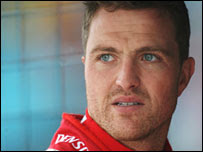 Ralf Schumacher is to quit Toyota at the end of the season after three years with the Japanese team, but has not confirmed which team he will move to.
Ralf Schumacher is to quit Toyota at the end of the season after three years with the Japanese team, but has not confirmed which team he will move to.
Schumacher's future has been the source of speculation following a torrid season in which the 32-year-old has taken five points in 15 Grands Prix.
"I have opted to look for a new challenge," he told his website.
"I'm going to have conversations in the coming weeks, and I will announce my decision when the season is over."
Schumacher is on course for his lowest points tally since joining Formula One in 1997. In each of his two previous seasons at Toyota he has amassed 20 points.
It is a far cry from his time at Williams, where he recorded six Grand Prix wins between 2001 and 2003 and was touted to follow in the footsteps of his world champion brother, Michael.
Schumacher added: "The financial aspect is far less important than the chance of being involved in the development of a car and being successful afterwards.
"On the one hand, I regarded it as a major and exciting challenge to be involved in the development of a new racing car.
"On the other hand, I also learned to like the Japanese style of living during my long stay in Japan before entering Formula One, and I still get on well with the Japanese mentality.
"But I have been waiting for years for a competitive car.
"Toyota was still a nice and interesting experience - particularly the co-operation with the team, engineers and mechanics, but it's time now to look for a new challenge."
Categories: Headline News, Sport News, World News
Olympic discus great Oerter dies
 America's former Olympic discus champion Al Oerter has died aged 71 after suffering from high blood pressure and heart problems.
America's former Olympic discus champion Al Oerter has died aged 71 after suffering from high blood pressure and heart problems.
He won gold medals in four consecutive Olympics, a record only he and American sprinter Carl Lewis share in track and field.
But in each of Oerter's successes in 1956, 1960, 1964 and 1968, the thrower from New York, set an Olympic record.
His wife Cathy Oerter said: "He was a gentle giant, he was bigger than life."
Peter Ueberroth, chairman of the United States Olympic Committee, added: "His legacy is one of an athlete who embodied all of the positive attributes associated with being an Olympian.
"He performed on the field of play with distinction and transferred that excellence to the role of advocate for the Olympic movement and its ideals."
Categories: Headline News, Sport News, World News
Children 'recover' from TV harm
 Toddlers who watch too much television are more likely to suffer later behavioural problems - but the damage can be reversed, say researchers.
Toddlers who watch too much television are more likely to suffer later behavioural problems - but the damage can be reversed, say researchers.
The Johns Hopkins University experts found that under-fives who watched over two hours a day increased their risk.
However, young children who watched too much, but cut back by five years old, removed the risk, the study in the journal Pediatrics suggested.
A UK expert said the level of damage could depend on the individual child.
There is fierce debate over the effect of exposure to television on young children, with increasing evidence to suggest that watching substantial amounts can affect behaviour.
In the US, the American Academy of Pediatrics recommends that children under two years old watch no television, with older children restricted to no more than two hours a day.
The study, from the Johns Hopkins Bloomberg School of Public Health, analysed data for 2,700 children, asking their parents about viewing habits and behaviour at two and five years old.
Bedroom television
One in five parents reported that their children watched two hours or more of television daily at both two and five.
This "sustained" exposure was linked to behavioural problems, while parents of children who had watched little television at two, and more than two hours at five were more likely to report problems with social skill development.
Having a television in the child's bedroom at five years old was linked to behavioural problems, poor social skills and also poor sleep.
However, children who watched more than two hours a day at two years old, but who had reduced their exposure by five, showed no increased risk of any of these problems.
Dr Cynthia Minkowitz, who led the study, said: "It is vital for clinicians to emphasise the importance of reducing television viewing in early childhood among those children with early use."
Dr Richard House, a lecturer in psychotherapy at Roehampton University, and a researcher into the effects of television in young children, said he was not convinced that children who cut back on television would be immune from harm.
He said: "Human behaviour is far more complex than these measures of behaviour and social skills - there may well be some more subtle form of harm that is undetected.
"Every child is different, and I'm very sceptical about the notion that it is appropriate to give families blanket recommendations about the amount of television their children should watch.
"Some children are extremely sensitive to the effects of television."
Categories: Headline News, Health, World News
Record close for New York shares
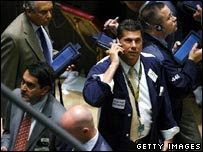 Monday, 1 October 2007
Monday, 1 October 2007
New York's leading shares have broken their record closing level after economic data made an interest rate cut more likely.
The rises came after a report showed that manufacturing grew at its slowest pace for six months in September.
The Federal Reserve's next rate-setting meeting is on 30-31 October.
The Dow Jones Industrial Average closed up 1.38% or 191.92 points at 14,087.55 - the first climb above 14,000 since mid-July.
Shares in banks were boosted by the perception that the worst of the summer's credit problems may be over.
Both Citigroup and UBS gave indications of the amount that the upheaval in credit markets had cost them in the past three months, but were confident that business was now returning to normal.
There was also a technical effect on trading from the start of the new financial quarter.
Many options expired on Friday, leaving traders free to set up new positions.
The technology-based Nasdaq rose 39.49 points or 1.46% higher at 2,740.99.
The S&P 500 index rose 20.28 points or 1.32% to 1,547.03.
Categories: Businnes News, Headline News, World News
Palm in red as iPhone grabs sales
 Monday, 1 October 2007
Monday, 1 October 2007
The US handheld computer maker Palm has reported a three-month loss as the launch of Apple's iPhone hit sales of its own smartphones.
It made a net loss of $841,000 (£412,000) between June and August, compared with a profit of $16.5m in the same three months of 2006.
Palm warned on 19 September that it was likely to report a loss.
Analysts blamed it on increased competition from Apple and other manufacturers of high-end phones.
It is the first set of results since Palm sold one quarter of its shares to the private equity house Elevation Partners.
"As we move toward completing the recapitalization transaction with Elevation Partners, we are excited to strengthen our ability to accelerate Palm's growth in the future," said Palm's chief executive Ed Colligan.
Apple launched its iPhone in the US on 29 June.
Palm's Treo systems may also have been losing out to the Blackberry devices made by Research in Motion.
Palm recently withdrew its Foleo keyboard and monitor devices for its Treo smartphones.
But it has launched its Centro device, which is a lightweight, cheaper device, designed to compete with manufacturers such as Samsung.
Categories: Businnes News, Headline News, World News






